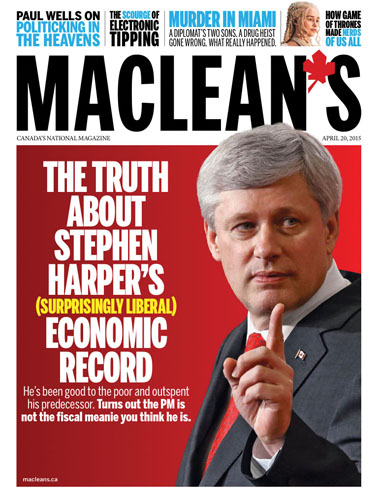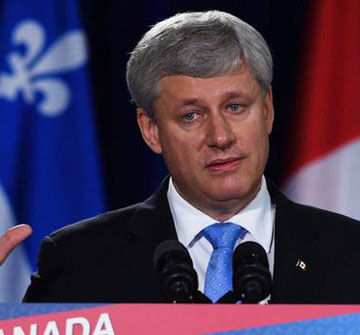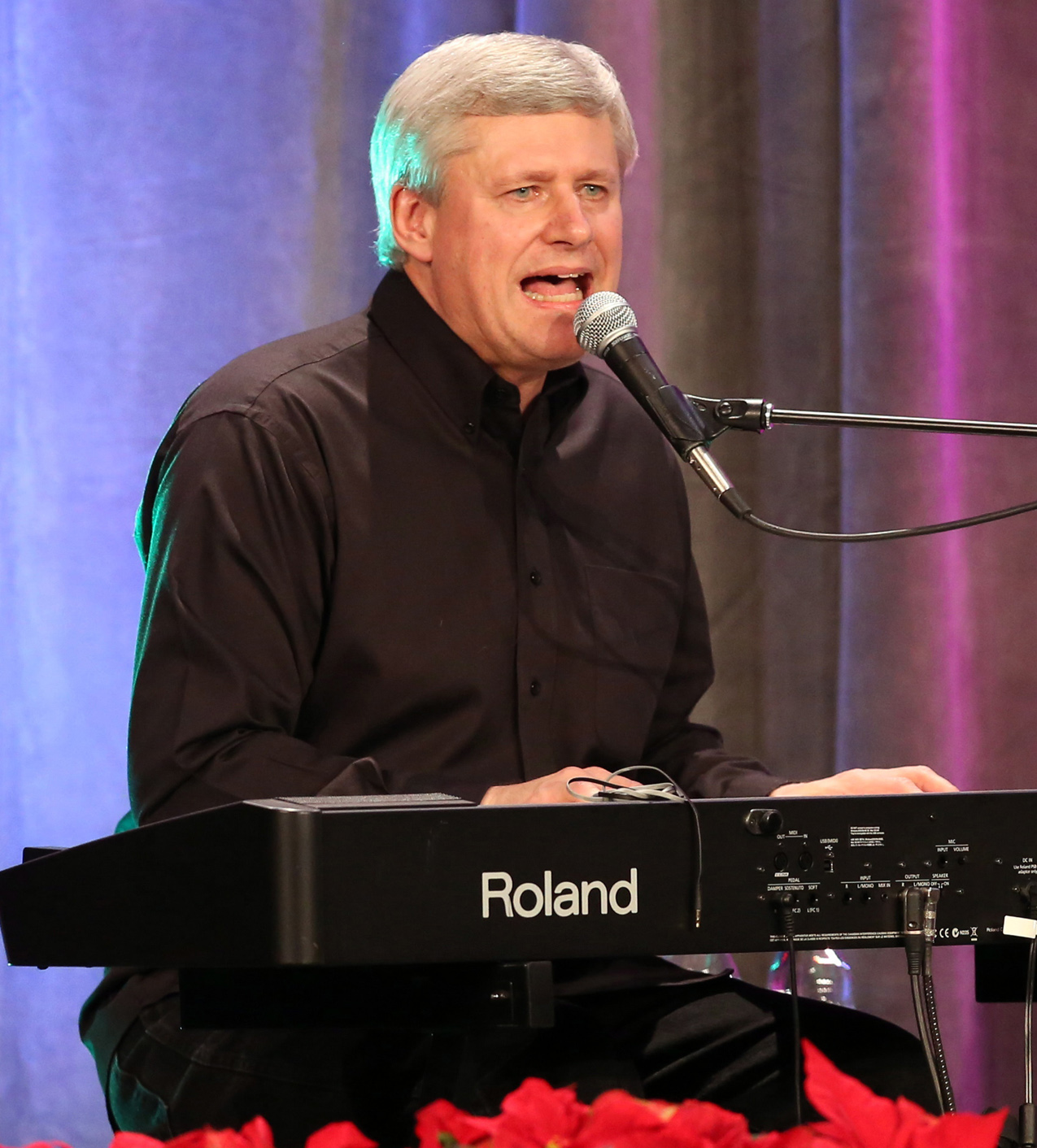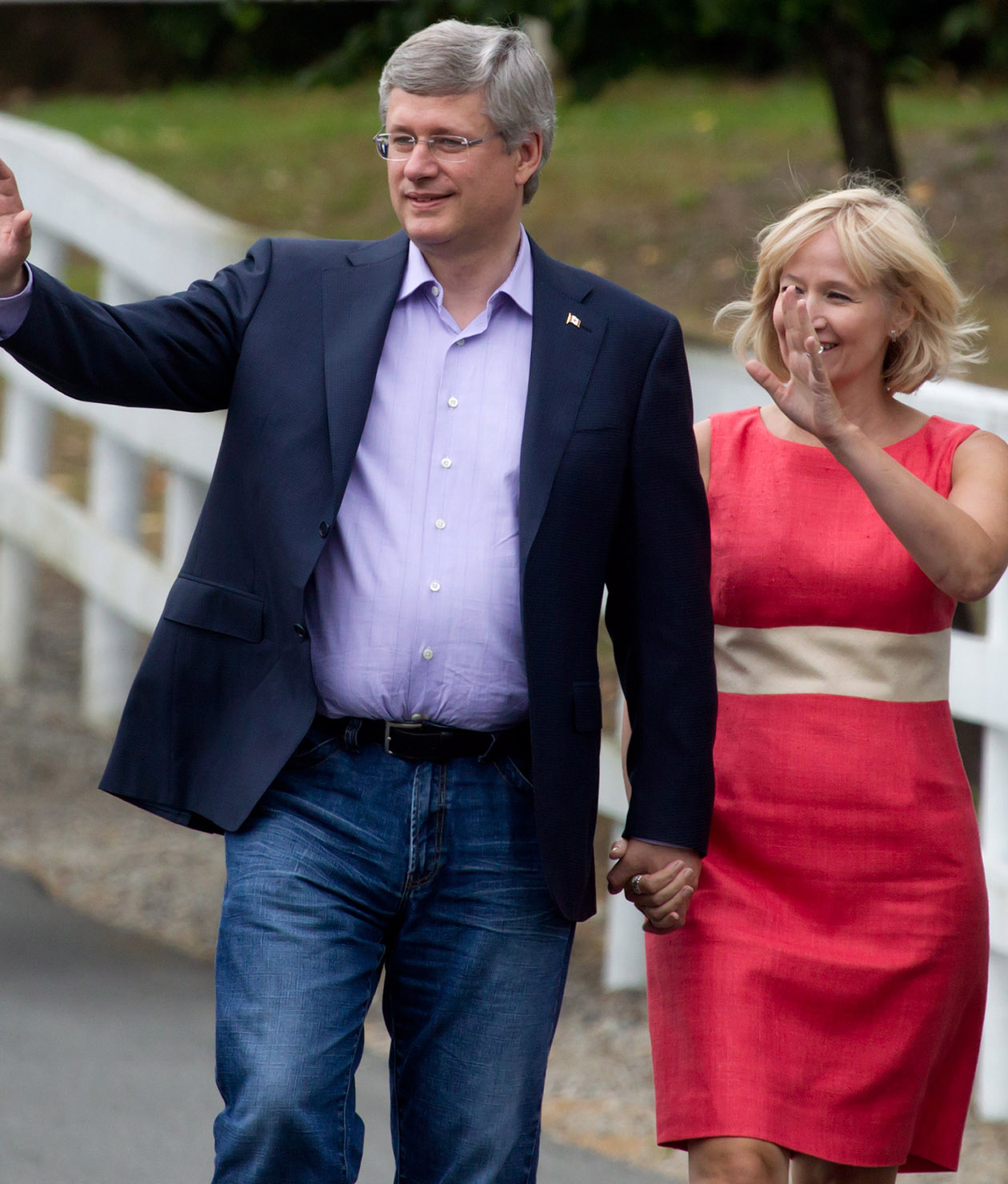Ave atque vale Stephen Harper MP : his Conservative government of Canada could have been a lot worse
Aug 26th, 2016 | By Randall White | Category: In Brief

Outgoing prime minister Stephen Harper arrives at his Langevin Block office in Ottawa, Wednesday, October 21, 2015, just after his government’s defeat in the October 19 Canadian federal election. THE CANADIAN PRESS/Adrian Wyld.
Those of us who regularly have breakfast while watching cp24 in Canada’s most disliked city region will already have seen the reassuring video of former Prime Minister Stephen Harper, resigning today as Member of Parliament for Calgary Heritage.
I never voted for Mr. Harper’s party, and I remain opposed to most of its declared  policies. As he takes the final finishing step in his partisan political career, however, I have a little more respect for him than when his government first took office on February 6, 2006.
Judging from this morning’s video, he seems content and even happy with his time as a democratically elected political leader. Â And I think he has enough of a right to feel this way.
In the end he was a more typical Canadian politician than he seemed at first. (Or maybe any at all long-lasting prime minister of Canada soon comes to see  that there is limited room for real manouevre in Canadian public policy, for a host of tedious good reasons?)

G̩rard Deltell (right) takes 51% of the vote for the Harper Conservatives on October 19, 2015 Рin the Quebec City riding of Louis-Saint-Laurent, named after former Liberal prime minister Louis St. Laurent, and largely a reconfigured version of his old riding of Quebec East. At least one thing PM Harper could smile about on that occasion. (CBC.)
Stephen Harper recited, for example, a litany of conservative achievements in this morning’s video clip. But like others I think that in broad economic policy he finally had a lot in common with his Liberal predecessor Paul Martin. (And to me that also had a lot to do with the growing support in the province of his birth that finally gave him a majority government in 2011.)
Similarly, as founder of the modern Conservative Party of Canada, Stephen Harper stressed the continuing importance of the French language in Canadian public life, to his everlasting credit. And it was no accident that even through the tears of the 2015 election he was rewarded with such headlines as “Conservatives more than double seat count in Quebec.”
* * * *
 I am not now and have never been a conservative myself, and I could draw up a long list of complaints about destructive Harper government policies. But that would be insensitive on the day the former prime minister announces his retirement from elected political life. I will confine myself to just two broad concerns, at the wilder end of practical politics in Canada today.
I am not now and have never been a conservative myself, and I could draw up a long list of complaints about destructive Harper government policies. But that would be insensitive on the day the former prime minister announces his retirement from elected political life. I will confine myself to just two broad concerns, at the wilder end of practical politics in Canada today.
One conservative gesture of Stephen Harper’s time in office that I found altogether wrong-headed and unnecessary was his renewal of federal government support for the old colonial role of the British monarchy in Canada.
(Though here again it could be said he was just trying to follow the model of traditional conservative politicians in Canada. And Justin Trudeau today sometimes seems to be paying him the compliment of imitation on this file, to the even greater dismay of all we progressive Canadian republicans who know the future is ours … eventually.)
My second note of complaint concerns the one policy of Mr. Harper’s I did very much support – his (I still think) rather clever but still high-minded plan for step-by-step Senate reform.
I was disappointed that he did not use his 2011 parliamentary majority to press ahead with this plan (which would have given us at least the beginnings of a more democratically elected Senate), and let whatever and whoever wanted to appeal to the Supreme Court go ahead .
I think this would have been more in the interests of vital, much-needed Canadian nation-building than the Supreme Court reference on Senate reform Mr. Harper eventually gave in to – again in a very traditional Canadian politician’s spirit of caution, and suspicion of bold action. (Such things can only get a country like Canada in too much trouble, etc, etc ..)
Two very final thoughts.
First, obviously Mr. Harper’s one great and undeniable Canadian nation-building achievement was to bring the West into the corridors of federal power in Ottawa at last. (With all due respect to John Diefenbaker from Saskatchewan and R.B. Bennett from Alberta, in the mythical history of the 1867 confederation’s first century).
 Second, in Prime Minister Harper’s earliest days in office one of the most provocative balls in the air sometimes seemed to be some kind of alliance between the Harper Conservatives and Gilles Duceppe’s Bloc Quebecois.
Second, in Prime Minister Harper’s earliest days in office one of the most provocative balls in the air sometimes seemed to be some kind of alliance between the Harper Conservatives and Gilles Duceppe’s Bloc Quebecois.
The most solid happening on that front took place late in November 2006, when Mr. Harper introduced a motion in the Canadian House of Commons recognizing “that the Quebecois form a nation within a united Canada” – subsequently supported by an overwhelming 266 to 16 majority in the House, on November 27.
I sometimes wonder if this may ultimately prove one of Stephen Harper’s most enduring contributions to Canadian nation building, somewhat further down the road, when some Canadian political leader is for some reason a little bolder than usual.
In any event, for the time being it may be most appropriate to quote the Latin author Catullus : “Multas per gentes et multa per aequora vectus / advenio … / … prisco quae more parentum / tradita … / … accipe … / … in perpetuum … ave atque vale.” (Or for those smart enough not to take Latin in high school, when Stephen Harper was still a Liberal : “Through many countries and over many seas / I have come … / … blessed / by the tradition of our parents … / Accept … / … for eternity … Â Hail and Farewell.”)



